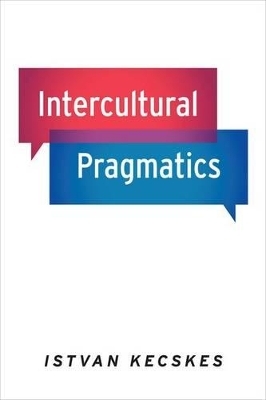
Intercultural Pragmatics
Seiten
2013
Oxford University Press Inc (Verlag)
978-0-19-989265-5 (ISBN)
Oxford University Press Inc (Verlag)
978-0-19-989265-5 (ISBN)
In Intercultural Pragmatics, the first book on the subject, Istvan Kecskes establishes the foundations of the field, boldly combining the pragmatic view of cooperation with the cognitive view of egocentrism in order to incorporate emerging features of communication.
Intercultural Pragmatics studies how language systems are used in social encounters between speakers who have different first languages and cultures, yet communicate in a common language. The field first emerged in the early 21st century, joining two seemingly antagonistic approaches to pragmatics research: the cognitive-philosophical approach, which considers intention as an a priori mental state of the speaker, and the sociocultural-interactional approach, which considers it as a post factum construct created by both speaker and hearer though conversation. Istvan Kecskes, an early proponent of intercultural pragmatics, was among the first to propose merging the two to form the socio-cognitive approach now core to the field.
In Intercultural Pragmatics, the first book on the subject, Kecskes establishes the foundations of the field, boldly combining the pragmatic view of cooperation with the cognitive view of egocentrism in order to incorporate emerging features of communication. He argues that people cooperate by generating and formulating intention that is relevant to the given actual situational context. At the same time, however, because of their egocentrism they activate the most salient information to their attention in the construction and comprehension of utterances.
Within this approach, interlocutors are considered as social beings searching for meaning with individual minds embedded in a socio-cultural collectivity, and intention is a cooperation-directed practice that is governed by relevance which depends on actual situational experience.
Intercultural pragmatics is a rapidly-growing field, and the only subfield of pragmatics to incorporate features of intercultural interaction into mainstream pragmatics. This volume offers both a valuable synthesis of current research and a new way to think about pragmatics.
Intercultural Pragmatics studies how language systems are used in social encounters between speakers who have different first languages and cultures, yet communicate in a common language. The field first emerged in the early 21st century, joining two seemingly antagonistic approaches to pragmatics research: the cognitive-philosophical approach, which considers intention as an a priori mental state of the speaker, and the sociocultural-interactional approach, which considers it as a post factum construct created by both speaker and hearer though conversation. Istvan Kecskes, an early proponent of intercultural pragmatics, was among the first to propose merging the two to form the socio-cognitive approach now core to the field.
In Intercultural Pragmatics, the first book on the subject, Kecskes establishes the foundations of the field, boldly combining the pragmatic view of cooperation with the cognitive view of egocentrism in order to incorporate emerging features of communication. He argues that people cooperate by generating and formulating intention that is relevant to the given actual situational context. At the same time, however, because of their egocentrism they activate the most salient information to their attention in the construction and comprehension of utterances.
Within this approach, interlocutors are considered as social beings searching for meaning with individual minds embedded in a socio-cultural collectivity, and intention is a cooperation-directed practice that is governed by relevance which depends on actual situational experience.
Intercultural pragmatics is a rapidly-growing field, and the only subfield of pragmatics to incorporate features of intercultural interaction into mainstream pragmatics. This volume offers both a valuable synthesis of current research and a new way to think about pragmatics.
Istvan Kecskes is Professor of Linguistics and education at the State University of New York, Albany. He is the President of the American Pragmatics Association and Editor-in-Chief of the journals Intercultural Pragmatics (De Gruyter), Chinese as a Second Language Research (De Gruyter) and the Mouton Series in Pragmatics. He is the co-editor of the Journal of Language Aggression and Conflict (Benjamins).
Introduction ; 1. Current pragmatic theories ; 2. The socio-cognitive approach ; 3. Pragmatic competence ; 4. Encyclopaedic knowledge, cultural models, interculturality ; 5. Formulaic language use ; 6. Context ; 7. Common ground ; 8. Salience ; 9. Politeness and impoliteness ; 10. Methods of analysis ; Epilogue
| Zusatzinfo | 5 b&w illustrations |
|---|---|
| Verlagsort | New York |
| Sprache | englisch |
| Maße | 157 x 236 mm |
| Gewicht | 544 g |
| Themenwelt | Schulbuch / Wörterbuch ► Wörterbuch / Fremdsprachen |
| Geisteswissenschaften ► Philosophie ► Sprachphilosophie | |
| Geisteswissenschaften ► Sprach- / Literaturwissenschaft ► Sprachwissenschaft | |
| ISBN-10 | 0-19-989265-2 / 0199892652 |
| ISBN-13 | 978-0-19-989265-5 / 9780199892655 |
| Zustand | Neuware |
| Haben Sie eine Frage zum Produkt? |
Mehr entdecken
aus dem Bereich
aus dem Bereich
Aspekte einer Ontologie des Logos
Buch | Hardcover (2024)
Springer Fachmedien (Verlag)
119,99 €
Wie die Menschheit zu ihrer größten Erfindung kam
Buch | Softcover (2022)
C.H.Beck (Verlag)
18,00 €
Macht und Legitimität politischer Sprache im Prozess der europäischen …
Buch | Softcover (2023)
Nomos (Verlag)
74,00 €


